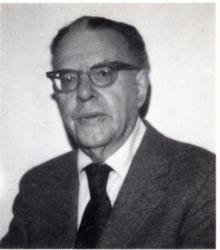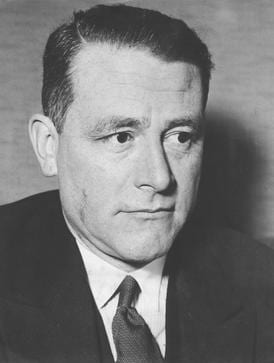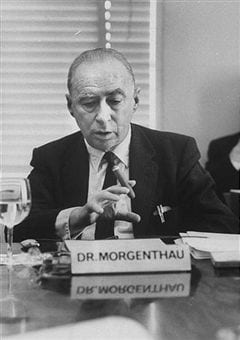By guest contributor Jonathon Catlin
Nicolas Guilhot (Centre National de la Recherche Scientifique) spoke on his new book, After the Enlightenment: Political Realism and International Relations in the Mid-Twentieth Century (Cambridge, 2017) at the New York University Intellectual History Workshop on May 16, 2018. He was introduced by Stefanos Geroulanos (NYU), while Gisèle Sapiro (École des Hautes Études en Sciences Sociales) and Hugo Drochon (Cambridge) provided responses. An audio recording of the discussion is available at the bottom of this post.

Nicolas Guilhot, After the Enlightenment: Political Realism and International Relations in the Mid-Twentieth Century (Cambridge, 2017)
After the Enlightenment is a collection of six essays that have been reworked to tell an intellectual history of realist political thought in twentieth-century America. It tracks a gradual displacement within American political science and foreign policy in the mid-twentieth century: the triumph of “political realism” and the fledgling discipline it took hold of, International Relations (IR). Initially premised on the contingency of power and decision, the field ultimately became wedded to “rational choice,” a “new basis on which political decisions could be taken without democratic mandate” because they promised potentially “unanimous consent” (24). Guilhot convincingly argues that even as the rationalized field of IR moved toward systems theory and cybernetics, it never fully abandoned its roots in Christian values and aristocratic traditions of decision-making and leadership. Realism earned the backing of powerful institutions like the Rockefeller Foundation—the “midwife” of IR—and turned out to be one of the most enduring offspring of the rationalistic social sciences’ heyday in the early Cold War era (42).
Guilhot opens with pressing stakes for why we should care about political realism’s enduring legacy:
We are still…capable of great uprisings against a recognized threat or danger. But we are so confused in our thoughts as to which positive goals should guide our action that a general fear of what will happen after the merely negative task of defense against danger has been performed paralyzes our planning and thinking in terms of political ideas and ideals. (1)

John Herz
These words were written in 1951 by John Herz, a German-Jewish refugee scholar, yet they “nonetheless resonate uncannily with our present situation.” After 9/11, Guilhot writes “we too have become engulfed by our own concern with security and confused about the more general meaning and purpose of politics.” In the wake of that catastrophe, “security has become the universal framework of political thinking and the primary deliverable of any policy, foreign or domestic, often overriding well-established constitutional rights and provisions.” Yet the pursuit of this narrow goal ultimately displaces normative political theory, the construction of positive ideals, and the pursuit of a more just world. Realism thus amounts to a form of anti-politics.
One hardly needs to look far for instances in which “facing and confronting ‘a recognized threat or danger’ has become the essence of government as well as a new source of legitimacy” (2). Guilhot’s native and adoptive countries, France and the United States, are home to two of the most egregious biopolitical defense and surveillance regimes today. In such states, “references to a permanent state of exception now sound like academic platitudes glossing over the obvious.” When “the notion of security has expanded to become the all-encompassing horizon of human experience,” he writes, “security itself has become an ideal—maybe the only ideal left.”

Nicolas Guilhot (CNRS)
Guilhot’s work exemplifies a new wave of intellectual history bringing together political theory, policy, and institutional history of the Cold War. This includes work by Daniel Bessner, with whom Guilhot co-edited The Decisionist Imagination: Sovereignty, Social Science, and Democracy in the Twentieth Century (Berghahn, forthcoming 2018). Bessner is also author of Democracy in Exile: Hans Speier and the Rise of the Defense Intellectual (Cornell, 2018) and a forthcoming history of the RAND corporation (Princeton). It also includes the work on the “militant democracy” of Karl Loewenstein by Jan-Werner Müller and Udi Greenberg, with whom Bessner authored a popular critique of “the Weimar analogy” in Jacobin in the wake of the 2016 election of Donald Trump.
After the Enlightenment also engages present debates on the origins of neoliberalism such as Quinn Slobodian’s Globalists (Harvard, 2018). These works track how domains of social life in the mid-twentieth century, from international relations to market economics, fell under new regimes of scientific and technological management that shielded them from democratic contestation—and hence from politics itself, according to an ancient line of political theory equating politics with deliberative rationality and public speech running from Aristotle, to Arendt, to Habermas. As a recent review of Globalists aptly characterized one of its key insights: “the neoliberal program was not simply a move in the distributional fight, but rather about establishing a social order in which distribution was not a political question at all. For money and markets to be the central organizing principle of society, they have to appear natural—beyond the reach of politics.”

Carl Schmitt
The anti-democratic thrust of mid-century realism stems from its foundational premise, what Herz called the “security dilemma”: the ever-present possibility of conflict as “a basic fact of human life” (3). Herz is fairly unique in having tried to resist the most cynical and conservative implications of this premise; he strove “to strike a balance between the grim necessities of power and the striving for ideals,” alternately calling his project “liberal realism” or “realist liberalism.” Yet like many other realists, Herz ultimately capitulated to conservatism, abandoning liberalism, socialism, and internationalism. He was a student of Hans Kelsen, the Viennese legal positivist and author of the interwar Austrian constitution. Both were assimilated Jews who fled Europe for the United States after 1938 and found homes in American universities and policy circles. In her response, Gisèle Sapiro rightly pressed Guilhot to reflect on the significance of the experiences of exile and Judaism—even in secular, assimilated forms—for his thinkers’ realism. Herz gradually drifted away from Kelsen towards his arch-rival, Carl Schmitt, identifying his realist liberalism with Schmittian decisionism. For Guilhot, the failure of Herz’s liberal project is instructive: “It suggests that realism places limits upon the kind of political goals that one can pursue and indeed makes it difficult if not impossible to pursue positive or transformative goals” (4).
In order to retain the appearance of a politics of ideals, realism rewrote the history of political thought, appropriating the “glorious lineage” of Thucydides, Machiavelli, and Hobbes as realism’s forefathers. By linking a new politics of decision to the tradition of political “republicanism,” realists came to develop a school of thought that could justify “dictatorial measures in the defense of freedom” (26). Political realism thus conflated two distinct forms of realism in order to establish its “historical legitimacy.” First, the ethical realism of Machiavelli, which does not “imply a pessimistic anthropology or a regressive social ontology,” but simply proposes “prudential conduct” that is “naturalistic, pragmatic, and concrete.” The cunning of political realism in the mid-twentieth century was to wed this practical wisdom to the needs of Cold Warrior ideology. The hybrid that resulted is by definition a “conservative realism” insofar as it “stifles the capacity to elaborate any political project beyond the maintenance of order.” Realism is an exact reaction to utopian aims of the Atlantic revolutions and the rise of mass democracy. It was its era’s most influential representative of the Counter-Enlightenment.
Guilhot’s critique of realism targets not only its vision of global power, but especially the ways it perpetuates an “exhaustion of alternatives” (5). He thus remains deeply skeptical of those today turning back to early realism “as a potentially progressive intellectual project.” Realism is considered one of the only “grand narratives” still standing, even by some on the Left. Notably, it has been invoked to critique of America’s slip from “soft-power” “democracy promotion” in the 1980s into costly militarized intervention under recent administrations. Realism has also been hailed as one of the last genuinely “political” responses to neoliberal globalism that can still be voiced in policy circles. Yet Guilhot reveals that the progressive attempt to reclaim realism today “to oppose neoliberal depoliticization fundamentally misunderstands realism and ignores how much it has in common with neoliberalism” (6). Already in his 1955 essay “The Political Thought of Neo-Liberalism,” Carl J. Friedrich, a German refugee, argued that neoliberalism was nearly indistinguishable from realism; Guilhot calls them “twin ideological movements born in the crisis of the 1930s that reacted to the crisis of liberalism and to the rise of totalitarianism.” Both were essentially defensive movements, sharing a neo-Burkean anthropology. Both thought liberalism could only be saved by illiberal means and saw themselves as building a “concretely managed order” that sought to “insulate from democracy core domains of decision-making, including foreign and economic policy, and to entrust them to a select elite of expert decision-makers” (7). Like Bessner, Guilhot argues that “decisionism” had appeal across the political spectrum and was hardly evidence of Schmitt lurking behind every realist thinker. One of the early realist’s most influential ideas was their conception of politics as an art, not a science; in genuinely political circumstances, there are no rational answers, only force and the wisdom of experience and leadership required to execute it. Yet their belief in the irrationality of public opinion led them to a new God, rational choice, “to legitimate economic and political decisions.”

Hans Morgenthau
Hans Morgenthau is often considered the father of realism. He was a German Jew forced from Europe by Nazism, and ended up as a professor of political science at the University of Chicago. He was also one of realism’s most explicit critics of the dangers of mass democracy. For Morgenthau’s generation, “Even their analysis of totalitarianism was premised upon a critique of its democratic origins” (15). “Fascism,” he wrote in a 1966 review of Ernst Nolte’s Der Faschismus in seiner Epoche, “can be considered the consummation of the equalitarian and fraternal tenets of 1789.” As the Harvard political theorist Judith Shklar—yet another Jewish refugee—wrote of the realists, “rationalism sooner or later must and did lead to totalitarianism” (67). Yet Guilhot shows that realism’s success ultimately lies in its deviation from this initial opposition to rationalism and liberalism toward compromise with these leading values of its era.
While Morgenthau became the figurehead of IR, Guilhot shows that he shared much of his worldview with figures in very different fields, including the Isaiah Berlin and the German theologian Reinhold Niebuhr (who went so far as to call Augustine the first realist). Together they forged “a powerful intellectual program that blended anti-liberal and Christian conservative elements”—especially a lapsarian Christian negative anthropology and suspicion of science—“with a rhetoric of the defense of liberalism” (15). As Hugo Drochon put it, for Guilhot’s realists there was a natural affinity between the Christians’ “we have only God” and the decisionists’ “we have only the nation state.” While Carl Schmitt actually reviewed Morgenthau’s first book, Drochon argued that the realists didn’t really need him; as the example of Niebuhr illustrates, religion could have grounded realism on its own. Extending realism’s Christian and conservative lineage back to earlier reappraisals of Machiavelli such as Friedrich Meinecke’s 1924 Die Idee der Staatsräson in der Neueren Geschichte, Drochon challenged Guilhot’s framing of realism as a postwar, Cold War phenomenon.
Considering American political culture bereft of the necessary moral resources to combat totalitarianism, the realists, many of them witnesses to the collapse of Weimar, argued that “liberalism, if left to its own devices, was incapable of ensuring its own survival.” Given similar anxieties today, Guilhot’s critical reassessment of mid-century realism could not be more timely. By reconstructing the rich beginnings of realist ideas still influential today, he reveals their latent commitments to be complicit with technocratic and unrepresentative forms of politics under fire today. Once hailed as a scientifically unimpeachable solution to democratic crisis, Guilhot leads us to see realism rather as partly responsible for our present crisis of democratic representation.
Jonathon Catlin is a Ph.D. student in the Department of History at Princeton University. His work focuses on intellectual responses to catastrophe, especially in German-Jewish thought and the Frankfurt School of critical theory.



July 23, 2018 at 12:07 pm
Reblogged this on Project ENGAGE.